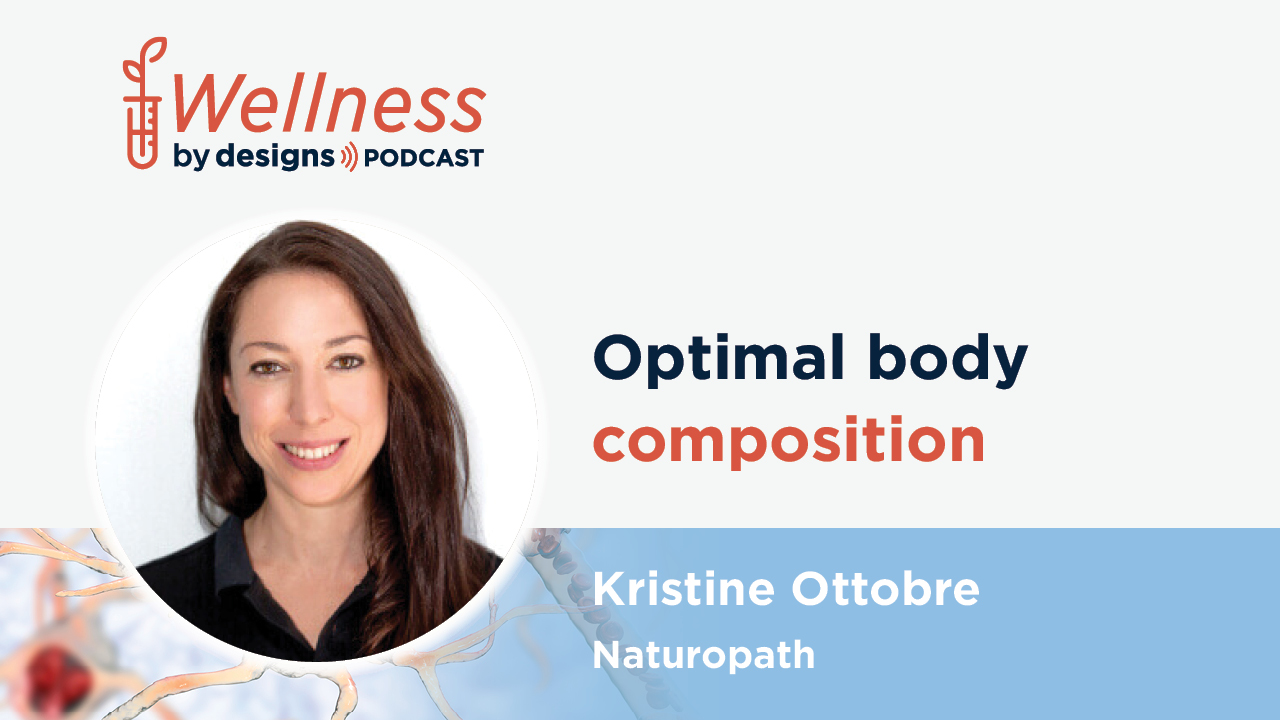

Joining us today is Naturopath and Registered Nurse Kristine Ottobre, who specialises in optimising body composition and increasing performance in athletes and fitness competitors today we’ll be discussing “Optimal Body Composition.”
In this episode, Kristine discusses:
- Why she chose to choose to specialise in Body composition optimisation
- Her intake and assessment process
- What supplements have merit in her patients
- The microbiome and fat accumulation connection
- Her approach to injury in patients
- Common red flags
About Kristine
Kristine Ottobre draws on her medical background as a Registered Nurse and current practice as a Naturopath to provide an integrated health service which uses conventional and functional diagnostic methods combined with evidence-based research while treating with natural therapeutics such as herbs, nutritional supplementation and implementing lifestyle and nutritional changes.
Kristine is the owner and founder of Wellixa, where she specialises in optimising body composition and increasing performance in athletes and fitness competitors. Kristine also has a special interest in women’s hormones and adrenal health and commonly works with clients with long-standing gastrointestinal imbalances.
Connect with Kristine
Website: www.wellixa.com.au
Transcript
Introduction
Andrew: This is “Wellness by Designs,” and I’m your host, Andrew Whitfield-Cook. Joining us today is Kristine Ottobre. And today, we’ll be discussing “Optimal Body Composition.” Welcome to “Wellness by Designs,” Kristine. How are you going?
Kristine: I’m great. Thanks. How are you?
Andrew: An absolute pleasure. Now, this is something that interests me greatly as I age, mature, nah, age. So, but, first, can you tell us a little bit about your background because you’re a registered nurse, you’re also a naturopath. Tell us about how you blend those two or, indeed keep them separate.
Kristine: Well, I do blend them just by practising integratively. So with my registered nursing, it was not fitness related, so I specialized in cardiac, and then I went into neonatal intensive care. But I guess throughout that, I’ve always loved fitness and have always been into living a healthy lifestyle, eating good nutrition.
So I guess my nursing side has probably helped me look at things a little bit more clinically and enabled me to read blood tests and get into contact with many specialists that I use for referrals for clients. So that’s how I kind of combine both sides together. Because I love looking at things clinically and diagnostically but treating with natural treatments.
Andrew: Great. Two very interesting, although diverse specialties cardiac and neonatal IC.
Kristine: Mmh, yes.
Andrew: So you would’ve seen some traumatic if not devastating conditions there, like, you know, neonatal necrotizing enterocolitis in EC along with, you know, at the other end of the spectrum, people labouring with their cardiac output, if not dying from issues with cardiac. Is that where the love for natural medicines started? Did it start earlier? Why do naturopathy?
Kristine: Well, to be honest, when I… So I guess going back a little bit, even further. So I was raised quite unconventionally. My mom was a bit of a hippie and she did aid work. So I grew up in third-world countries in India, Mexico, Thailand, Korea; wherever she wanted to go, we’d go with her. And then I ended up carrying on that into my teen years as well.
And initially, when I was deciding what I wanted to do, it was to study naturopathy, but then I was guided by a career counsellor saying there wasn’t much financial return in naturopathy and they advised me to do nursing because I could put my humanitarian aid history, I guess, into practice and maybe go back overseas and work as a registered nurse in frontiers or something like that.
So when I was younger, that was my aspirations of what I wanted to do. So I guess as I went through my career, my love for natural health still stayed and I ended up going full circle and studying naturopathy at the end of the day anyway.
Andrew: Right. Got it. So the blending, I mean, it must have been a real chore for you. I was so anti-natural medicine when I was nursing. So ignorant, so arrogant. Now, I’m not so ignorant. But you had this knowledge right from the get-go that there was something more than that medical bottle.
That there was something more to be done for patients, particularly in countries that can’t afford expensive pharmaceutical medicines, they have to rely on natural medicines. So is that where it was sort of cemented or?
Kristine: I think a lot of it was cemented through nutrition. You know, and we all know that with natural health and getting results at all with our body composition or our health, it all starts by the food that we eat. And I think in conventional medicine, you know, specifically cardiac patients, and what you feed your patients in hospital, like, the diet’s just horrendous, what’s available to patients.
And I found that in, you know, the Royal Children’s Hospital or NICU, like, the food options are just also processed and commercialized. And really health starts in our gut and from the food that we eat. And they don’t even teach that in medicine really. They don’t teach nutrition. So I think that’s very lacking in the preventative health side.
Andrew: You know, one thing that really saddens me is they’ve researched how much money it would cost to have truly nutritious food, and it’s not that much more. It can be done equitably. It can be done viably, financially viably. Why it isn’t done befuddles me because, in the end, they’re gonna get less re-hospitalizations, greater health outcomes.
To me, it’s insanity. It’s just, why? But anyway, we’ll leave that for another podcast. Now, we’ve gotta blend from cardiac and neonatal intensive care to specializing in body composition. What took you there? What was it that made you specialize?
Kristine: Yeah. Good question. Well, I’ve always been into fitness, and way back when I was doing my nursing still, I started to become a little bit more focused on achieving specific results, such as, you know, getting abs, maybe wanting to do a body competition. And then I met my husband who specialized in those things.
So I enrolled into his personal training program, became a client. And I guess, I started to work a lot on what served me specifically. So trying to optimize my energy levels. I had a level of adrenal fatigue as well from my nursing and all the shift work that I did. So I had really bad insomnia. And I was quite exhausted all the time sometimes to where I wouldn’t even be able to structure a sentence properly or really had a high level of brain fog.
And then I found that taking out certain foods such as gluten really helped to clear a lot of that out. So I became really passionate and focused on finding out what worked for me with my nutrition and just wanting to live the lifestyle that I wanted to do and focus on changing my health to be able to do that. So I guess, that’s what I always look for with my clients is, you know, they wanna achieve a certain lifestyle and it’s up to me to help them to be able to do that by supporting their health.
Andrew: Yeah. Great. And so take us through an intake and assessment. What sort of things do you look at? Do you do DEXA scans first up or do you look at a lengthy questionnaire?
Kristine: Well, I guess, first of all, it’s really finding out what the client wants to achieve and looking at their lifestyle. I send them a food diary to keep before they come in. So it’s a food and symptom diary that they keep for a week. So I find out a lot about their schedule, what time they eat their meals, their routine, and then the foods that they…and if any of the symptoms that they’re having are correlating with those foods as well.
And then, of course, that includes their health symptoms too. If they’re coming to do, like, a comp prep or weight loss from the gym, so my husband has a gym, then he uses calliper testing. I’m not sure if you are aware of the 12-site calliper test.
Andrew: Yeah.
Kristine: Yeah. So it’s a skin fold test and they measure certain sites of the body and that represents different hormonal processes. So whether it’s detoxification, aromatization, how a person sleeps. It’s something that was founded by Charles Poliquin, and he was a strength coach. He worked with a lot of athletes, so he did this practice. So I guess in monitoring a person’s body fat percentage, that’s what they initially start with and they have that done every two weeks to see how they’re progressing.
Andrew: Gotcha. So I’m familiar with, you know, certain ones that, forgive me, skinfold callipers were a long time ago when I used to be fit, but things like, you know, this site, the triceps, obviously, others are abdominal either side. But what can you tell from the different sites certainly in changes in those readings?
Kristine: Yeah, so I mean, again, for me coming as a clinical nurse, you know, and my husband first mentioned the test to me, I was like, “Oh, I don’t know, Todd, show me the research.” But it does. And I always do blood tests as well and other functional tests for my clients too. And it’s very interesting how everything correlates and the results all come up the same as to what is reflective of the client’s symptoms.
So, like, abdominal is reflective of your cortisol. Aromatization is usually triceps. If a person can tolerate a more high carbohydrate diet, then it’s due to a subscapular or your super iliac. So, yeah, it’s interesting to see how that actually does correlate with a person’s biology or to how they’re functioning as well. I can’t say it’s very found in research is probably something more just practically that I see.
Andrew: Right. But it’s got some basis. That’s quite amazing. I’ve never ever thought of that.
Kristine: Yeah. Yeah. It definitely does work. And it’s a really good way to see how a person is responding to their treatment nutritionally and with their training as well, and how it’s all working in with their lifestyle. Like, you know, if a person’s over training or if something’s going on in their life that’s increasing their cortisol, it’s really hard to get that abdominal section down. Yeah. So it is interesting to see how it all measures up at the end.
Andrew: That’s really interesting. So it’s not just a general loss of the calliper size if you like the readings over time, but it can be more specific depending on what’s happening to that person. That’s really quite, I’d say, that’s outside diagnostic, but certainly, management.
Kristine: Yeah. Yeah. And in terms of supplementation and things, especially with, you know, personal trainers, they use it a lot to see whether they need to increase a person’s carbohydrates or if they’re not so carbohydrate tolerant. If the person’s training too much, if they’re not sleeping and they need some more magnesium, if they have too much xenoestrogens maybe in the detoxification pathways need our supporting. So, yeah, it’s quite interesting how it all works together.
Andrew: Gotcha. Now you were talking about skin callipers, some people use DEXA scans. Do you prefer the skin callipers over DEXA?
Kristine: I would prefer DEXA scans, but they’re expensive for the client to get all the time. So, you know, a big way of keeping a client compliant and on a consistent plan is also managing their pocket as well. So we have done, like, comparatives between the DEXA and the calliper testing, and we probably find as far as body fat testing, it’s about 4% off what is usually accurate.
Andrew: Wow.
Kristine: So, like, a calliper site might come back with a person’s 8% body fat where in reality they might be 12%. So, yeah, it does measure differently.
Andrew: Yeah. But that’s reasonable given the cost of repeated DEXA scans. What about though doing, maybe in a type one personality, type A personality, a patient might just say, “Okay, well, look, let’s do a DEXA, let’s do the calliper and we’ll compare.” And then mostly you’ll use the callipers, and maybe a year later, you’ll say, “Okay, let’s revisit the DEXA?” Do you ever look at that sort of thing for some patients?
Kristine: Yeah. They do. Like, you definitely get a lot of clients that are very number driven and, you know, if they can do it, then they’ll just do the DEXA scan anyway. I think at the end of the day, it’s really used to see how the person is progressing. So it doesn’t really matter if it’s 4% out per se, but as long as the measurements are going in the right direction, that’s what it’s really about.
Andrew: Cool. And so when we’re talking about supplementation, you know, you’re talking about people who might be in cortisol overdrive because of stress. Like, how do you…? I shall ask a more general question. What supplements do you find have merit given your medical background, given your, you know, nursing background? And I know how we think. We think, like, it either works or it doesn’t, which ones have real merit?
Kristine: Well, I use a lot of adaptogens, so I use a lot of herbal tinctures with my clients. I find them very effective. I’ve never had anyone come back to me and say, “This hasn’t worked.” So, you know, it’s evidence-based practice really when you get those results for clients. So using, like, Ashwagandha, TriGandha that Designs for Health have that’s really good too.
If you’re using a herbal tincture then, you know, supporting the immune system, Astragalus, Withania, Romania, Ginseng’s really good with athletes as well. Yeah, those are my probably main adaptogens that I would use just for supporting cortisol regulation.
Andrew: Yep. Cool. And you were mentioning the gut, how important food is obviously tied in with that is the microbiota. How much weight do you give… Forgive the pun. How much weight do you give to balancing the microbiota?
Kristine: Yeah. The heaps are, like, a lot. It’s interesting to see how many of my clients come through and they all do a microbiome test because they all have symptoms. And I much prefer to do the testing to get a little bit more specific about what’s going on. I know there’s a lot of controversy about the microbiome testing might over-diagnose so, but I do find that it usually does, like, the results do usually correlate with symptoms.
And if you get a person’s digestion right before they start on a comp prep or for weight loss, like, you’re halfway there already. They can tolerate the whole competition prep so much easier, and the results are much faster as well.
Andrew: Gotcha. A couple of times, you’ve said comp prep. Can you explain that term?
Kristine: I’m sorry. So competition prep, if a person is doing a physique show or so a physique show is a natural bodybuilding show, so I usually only take on natural competitors because I don’t know much about people that compete with steroids. So I prefer to only go with what I know.
So natural bodybuilding is they’ll either do a physique show where it’s a little bit more muscular or it’s a sports model, or now they have bikini shows. So it’s all about physical presentation and how you show yourself on stage. And in the fitness world, yeah, it’s very familiar. Is that the word to use? People do it a lot.
Andrew: Yeah. Yeah. But it’s also…
Kristine: Once they start on their path, it’s you always see, “I’m thinking about doing a fitness show,” so, yeah.
Andrew: But it’s also, as you say, it’s so competitive and it’s fine-edged. We’re talking about, you know, a difference of, like, 1% or 2% in body fat to get them ripped and they’ll do anything to do that sometimes horribly at the expense of reasonable hydration. I know what happens on competition day, but take us through what happens in this group of athletes.
Kristine: Yeah. I guess that’s why myself and my husband love what we do and we’re so passionate about it because there is a way to do it where you’re not compromising the person’s health. And I know in the naturopathic field, it’s a big no-no to do, you know, competition prep or do, you know, where you’re getting yourself down to that much percentage body fat.
Definitely doing it for over a long period of time can be harmful to a patient’s health. But if you know what you’re doing, you can get there and pull yourself out quickly enough where you’re not doing much damage. So it really depends on how the client comes to you first off with their level of health and to how they are physically as to the time period that they’re going to compete in
So there’s probably about four different competition phases throughout the year. So it’s really just seeing where that person is at as to what time they can compete in. And a lot of that has to do with the guidance of the coach that they’re working with and that’s the personal trainer.
And if they’ve got health issues and they send them to myself as well and if they’re not in a good level of health, we’ll just say, “You won’t be ready to compete, or we’re not gonna support you to compete.” And it’s very important to have that level of honesty with them as well because there’s no way you wanna bring a client to the stage and they’re good physically, but then they’re gonna fall apart afterwards. And that’s very against our values too.
Andrew: Gotcha. Great. Nice to hear. I’ve also have to ask female competitors. Now, I’ve spoken with, you know, Kira Sutherland and Laura Brighton about this. They’ve done webinars about it. I’ve spoken with Natalie Burke about it, about, you know, too low, a fat content in a women’s body restricting menstruation and the normal signalling of menstruation. How do you manage that one? That’s a real sticky web that one.
Kristine: Yeah. Well, I mean, there are some women that can definitely handle it more than others, and it does have to do a lot with balancing the hypothermic geology access as well, and that stress response and that feedback loop to your hormones. So supporting them with adaptogens throughout their prep is very important.
And just keeping them at that sweet spot for not too long, and then after their comp prep, making sure that they’re having the appropriate amount of fats and calories without bringing them up too high, where it’s too much on their gut, as well as a high level of information, having all those different foods after they’ve been at a deficit for so long.
So it is a little, like, it’s very case-dependent. It’s very individualized. But there is a method to do it where you don’t have to stay in that deficit for too long of an amount of time to cause sustainable damage.
Andrew: Cool. And what about things like injuries? I mean, these people train with horrendous weights sometimes and, you know, there’s both isometric isotonic exercises that they do, you know, in variable, like, you know, pecks and things like that, biceps. I’ve seen a movie of a bicep ripping and it’s not nice. How do you combat injuries? How do you keep these people competition fit?
Kristine: Well, so that’s managed by my husband and the personal trainers. So when they come through the gym, they always have an assessment, a structural assessment and it’s bilateral. So seeing how they function on either side and then all together as well. And it’s never about going above your means. It’s getting the most out of what you can do.
And, you know, we’re not a big advocate of online training for that purpose. It was, you know, kind of had to do it during COVID and the pandemic because that’s all we had, but it’s quite challenging to work with someone online when you can’t see how they perform an exercise or, you know, if they’re doing the right techniques or if they’re gonna injure themselves.
So we work one on one with the client just to make sure they’re performing each exercise well. And I guess any injuries are managed, you know, by getting them to see a physiotherapist or osteopath, if something happens. And then we work together to ensure they’re doing the remedial exercises to repair that.
I guess more on my side as a naturopath, injuries or things that I’d see with my clients if they’re, you know, kind of not going in the right direction would be, you know, hypothermic amenorrhea, so losing their cycle too early or eating disorders such as being at a deficit with their calories and then they start binge eating or developing some sort of dysmorphia where after they comp prep, they’re not refeeding their body how they should because they wanna keep looking like they do for a longer amount of time. So a lot of it is working with the client’s mindset as well all throughout their journey too.
Andrew: I’m so glad you said that because it’s such an issue when people get stuck into what looks good. I mean, in my mind, a lot of these bodybuilders look better after the competition when they’ve got a more normal body. I mean, Kristine’s with… Okay.
Kristine: I totally agree.
Andrew: But I have to ask though about red flags. Now, you know, we’ve spoken about dehydration, but to go along with that, you’ve got electrolyte disturbances, you’ve got nutrient deficiencies, iron deficiencies, you’ve got delayed onset muscle soreness, which in some people seem trivial, but this can hurt.
So doms, iron deficiency, anemia, and, you know, you mentioned anemias, when do the red flags, you know, ding? When do you start to say, “Hang on, there’s something wrong here?”
Kristine: Well, so we do do the blood pathology testing at the beginning of, you know, their journey or their initial assessment. And then, you know, depending on how they are going and how they’re progressing as well, like, we always…so they have two-week check-ins all the time, you know, with the form to say, you know, “How have the energy levels been? What are your stools doing? What’s your digestion doing? Your sex drive?” So it is definitely assessed all throughout.
And then if they’re not getting the results or they start surfacing with something such as exhaustion or they’re not recovering, then you start to look at their nutrition, you know, what are they lacking? Are they absorbing what they’re getting? Optimizing that.
If that’s still not working, then you can use other supplements to support it. And then if they do need blood testing, again, well, we always do referrals. So that’s done as well. So then you get a real look of what’s actually going on instead of the guessing game.
Andrew: I know this is a whole podcast to talk about, but I need to ask you about some specific supplements. So, for instance, a lot of people will use creatine, glutamine, the branched-chain amino acids, citrulline, as well as on top of your general proteins, whether that be whey or plant-based or whatever.
How do you manage that? What they use, when they stop, because creatine sucks in water into the muscle fibre? Do they stop, like, on the day or day before a competition? How do you actually manage the use of these supplements?
Kristine: I use any of them. No, I’ll just market them back to me. No, I don’t use any of them. So we’re very low on all the support “hyped” marketing supplements. We use Designs for Health active body collagen as a preferred way of them getting, like, a protein supplement. If they need to use it as a meal replacement, then we use true protein, which is grass-fed.
And it’s just pure way. And as far as recovery goes, then it’s just an amino acid supplement by Thorne. Sometimes branched-chain amino acids are if people feel like they don’t have enough oomph through their training session or if they need a little bit more energy.
Andrew: Yeah.
Kristine: But really, a lot of it comes down to their lifestyle. How much sleep they’re getting, and the nutrition that they’re having. If all those essentials are supported, then there’s no real reason they need all those, you know, additional sports supplements. It’s just all marketing, to be totally honest.
Andrew: Interesting. Interesting. Kristine, this is a massive topic, you know, that whole supplement thing, that’s a thing on its own, but I like the responsible use that you talk about. And obviously, as a naturopath as a nurse, looking at the food is first and then, importantly, taking into account their mindset.
And it’s not that males don’t go through this; males do suffer from anorexia nervosa but has its greater preponderance in females. So, I’m so glad that you look at their mental state as well. It’s really encouraging and really interesting to see. Lovely how to see you care for your patients. Thank you so much for taking us through body composition issues today.
Kristine: You’re very welcome. Thanks for having me on.
Andrew: It’s an absolute pleasure. And thank you everyone, for joining us. You can get all the show notes of today’s podcast and listen to all the other podcasts on the Designs for Health website. I’m Andrew Whitefield-Cook.



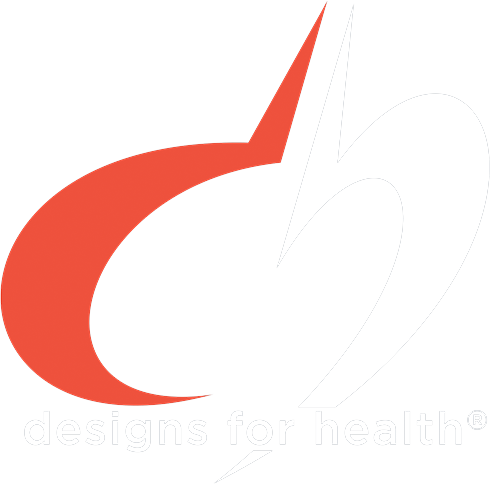


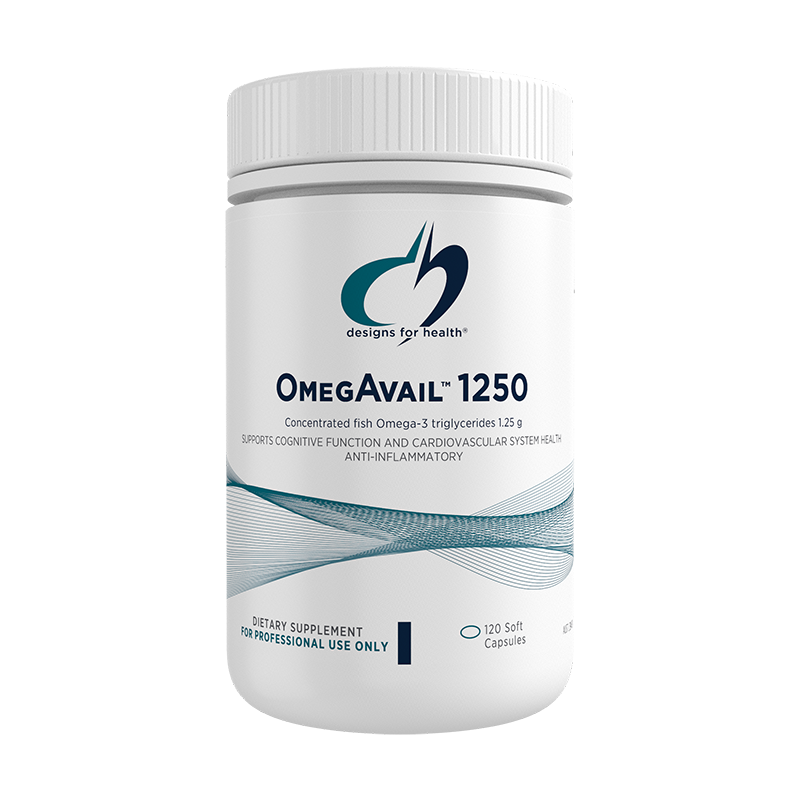
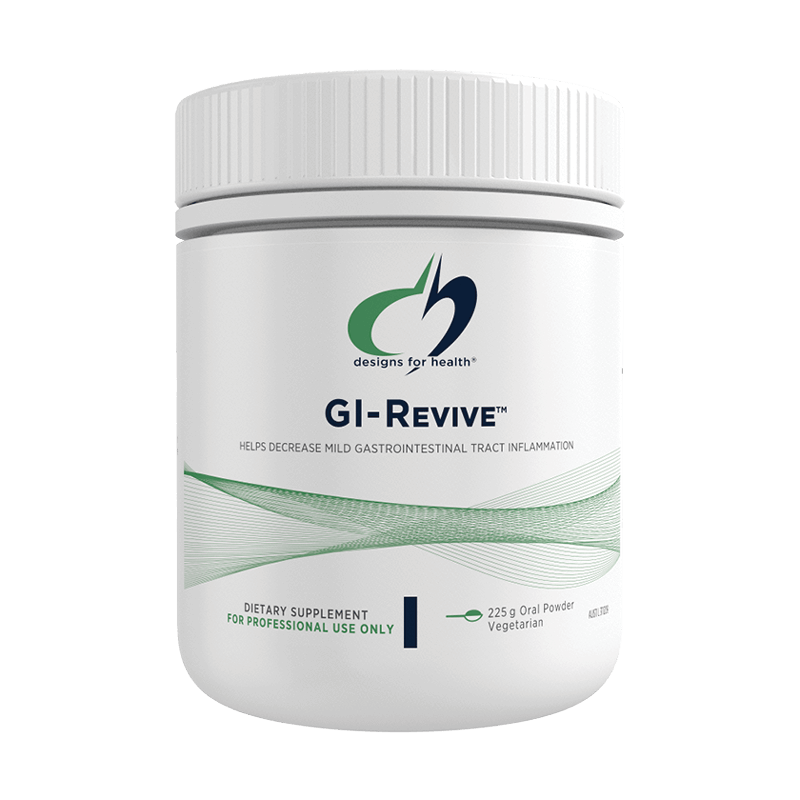
 Exploring Integrative Dentistry with Dr Ron Ehrlich
Exploring Integrative Dentistry with Dr Ron Ehrlich Essential Insights into Gallbladder Function and Care with Amie Skilton
Essential Insights into Gallbladder Function and Care with Amie Skilton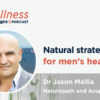 Natural Strategies for Men’s Health with Naturopath Jason Mallia
Natural Strategies for Men’s Health with Naturopath Jason Mallia